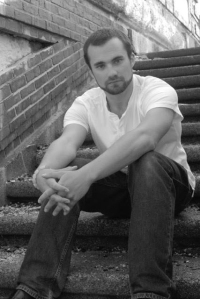 Canaan Morse is a translator, editor, and poet based in Boston. His translations of Chinese fiction and poetry have appeared in The Kenyon Review, Chinese Literature Today, Cha: An Asian Literary Journal, Asymptote, and other places. His first translated novel, The Invisibility Cloak by Chinese novelist Ge Fei, won the Susan Sontag Prize for Translation in 2014, and will be published as part of the New York Review of Books Classics Series in 2016. He writes and translates poetry and prose, and contributes bilingual reviews of Chinese books in translation to World Literature Today and Reading Translations. He is most recently a recipient of a 2015 Henry Luce Fellowship for Chinese Poetry in Translation, which provides for a month-long residency at the Vermont Studio Center, where he will compile and translate Taiwanese poet Yang Xiaobin’s first collection of poetry in English.
Canaan Morse is a translator, editor, and poet based in Boston. His translations of Chinese fiction and poetry have appeared in The Kenyon Review, Chinese Literature Today, Cha: An Asian Literary Journal, Asymptote, and other places. His first translated novel, The Invisibility Cloak by Chinese novelist Ge Fei, won the Susan Sontag Prize for Translation in 2014, and will be published as part of the New York Review of Books Classics Series in 2016. He writes and translates poetry and prose, and contributes bilingual reviews of Chinese books in translation to World Literature Today and Reading Translations. He is most recently a recipient of a 2015 Henry Luce Fellowship for Chinese Poetry in Translation, which provides for a month-long residency at the Vermont Studio Center, where he will compile and translate Taiwanese poet Yang Xiaobin’s first collection of poetry in English.
Canaan grew up on a farm in Maine with two parents who knew the importance of learning foreign languages. They arranged extracurricular language study for him starting in the first grade, and his first contact with Chinese was at ten years old, when he took six months of lessons with Dr. Zhang Hong, a professor at Colby College. Six years later, he went back to her as a high school senior with an independent study proposal. A year after that, she became his college advisor. The energy she and Canaan’s parents put into his education inspired what has always been a spiritual relationship to the Chinese language.
The desire to integrate admiration for poetry and prose with a love of foreign languages has motivated every career decision Canaan has ever made. His first major translation project was his undergraduate Honors thesis, a translation of the contemporary novella The Stewardess, by China’s famous “hooligan” author, Wang Shuo. In 2008 he studied Classsical and Modern Chinese literature at the Inter-University Program for Chinese Studies in Beijing, and met Eric Abrahamsen, founder of the nascent Chinese-literature-in-translation blog, Paper Republic. Canaan joined the community, and became a regular contributor. After moving back to Beijing to annotate his translation of He Qifang’s essay collection Painted Dreams, Canaan joined forces with Eric to turn Paper Republic into a publishing consulting business. In 2010 his team founded Pathlight: New Chinese Writing, the first literary quarterly to showcase Chinese literature in translation, and as Poetry Editor Canaan edited and published translations of work by over sixty Chinese poets. In 2014, he graduated with an M.A. in Classical Chinese Literature from Peking University, which he pursued in large part to expand his capabilities as a literary translator, and returned to the United States to pursue both translation and his own poetry, and to build ties with American publishers.
Canaan is deeply grateful to the ALTA Fellowship committee for affording him this opportunity to attend his second conference, and he hopes to serve as a volunteer for this year’s and future conferences. Last year’s ALTA was an eye-opening experience; he hopes to make this year’s conference a productive one.
